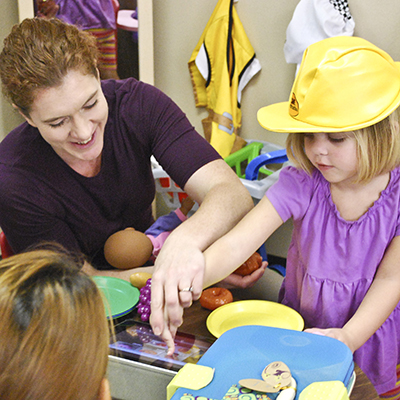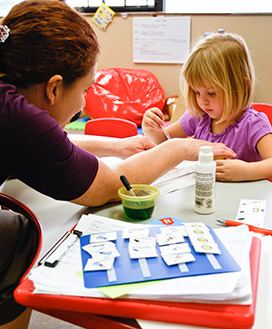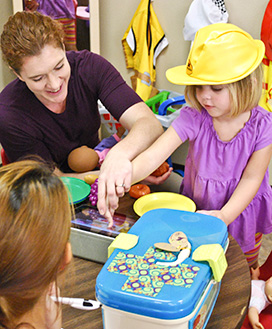B.S. in Education: Concentration in Special Education
Get an undergraduate degree in a field that makes a difference. Our program prepares you for a variety of opportunities in education today by molding teachers equipped to address individual differences in inclusive classroom settings.
From the first semester of admission into the program, students work in school classrooms and apply their coursework in real-life settings.
Upon graduation, students typically have 800 or more hours in classrooms and graduate with three certifications:
- Early Childhood (EC) to 12th-grade Special education
- EC to 6th grade General Education
- The English as a Second Language endorsement
Charles Butt Scholarship for Aspiring Teachers
The Charles Butt Scholarship for Aspiring Teachers consists of $8,000 in annual funding for up to four years, as well as ongoing training and development opportunities, mentorship from sitting public school educators, and participation in a statewide aspiring teachers network facilitated by the Raise Your Hand Texas Foundation.
Approximately 100 scholarships will be awarded through teacher preparation programs at 10 partner universities each year, with the cohort growing to include 500 scholars annually.
The competitive selection process includes:
- An application,
- Pre-screening by university teams, and a
- Day-long event consisting of a group activity, mock teaching lesson, and panel interview.
Criteria for Selection of Charles Butt Scholars
- Enroll or be enrolled full-time in a partner university program that will lead to a teaching certificate.
- Must be a Texas resident.
- Hold a strong academic record and history of achievement.
- Demonstrate peer or group leadership skills.
- Demonstrate a commitment to pursuing a career in education in high-needs Texas public schools upon completion of the program.
Support for Charles Butt Scholars
In addition to scholarship funding, the Raising Texas Teachers initiative will supplement received through partner programs by providing teacher candidates opportunities to benefit from ongoing professional development, mentoring and feedback from teachers and principals, and connections with fellow Charles Butt scholars across Texas.
This combination of education and supports is designed to ensure teacher candidates practice and develop pedagogical skills in authentic classroom settings, observe masterful teaching in action, reflect on feedback from expert teachers and school leaders, and participate in a community that fosters professional growth.
Criteria to maintain Scholarship Status
- Remain a full-time student enrolled in a program that will lead to a teaching certificate at one of the 11 partner programs.
- Maintain a minimum 3.0 grade point average.
- Participate in Raise Your Hand professional development activities.
- Receive a letter of recommendation for continuation from the IHE program leader each year.
- Plan to teach in a high-needs classroom for a Texas public school upon completion of the program.
Admissions Process
Freshman, change of major, and transfer students should follow all Texas A&M University and department admissions policies. View Texas A&M Undergraduate Admissions for full information.
Before beginning the certification program, students must apply and be admitted into the upper-level Teacher Education program.
Note: Applicants are reviewed by a committee and admitted on a competitive basis. Meeting the minimum requirements listed does not guarantee admission.
Program Details
Degree: Bachelor of Science in Education with concentration/certification in Special Education
Program Delivery: Traditional
Program Hours: 121
Contact Advisors
Our advisors can help you with Degree requirements, course scheduling, change of major requirements, connecting with university resources, and other general advising information.
Current students are assigned to a specific academic advisor. More information about advising can be found on their website.
Please visit our undergraduate advising hub to find your program’s advising contact.
Get Involved
Student Council for Exceptional Children (SCEC)
An outlet for students who are passionate about serving individuals with exceptionalities and learning the professional field of special education.
Field Experiences
- After completing 45-60 hours of prerequisite coursework, students may apply for upper-level admissions.
- Once admitted into the upper-level program, students begin their courses and field experience blocks.
- In all field experiences, university supervisors and mentor teachers provide direct and specific feedback on the teaching progress.
Block I
Block I involves approximately 165 clock hours of practicum in general education classrooms.
Your placement is in diverse settings in general education classrooms. You will see and apply methods learned in your courses, as well as participate in activities including teaching in several subject areas. You will learn how to deliver and modify effective instruction as you begin to hone your classroom management.
Block II
Block II consists of approximately 160 clock hours in special education settings.
During this time, you are in both high and low incidence placements. You will refine your teaching skills by delivering effective instruction to a variety of students. You are accountable for goals, objectives, and modifications.
Block III
Block III focuses on adolescents and transition with about 40 clock hours.
This block will grow your experience with adolescents, multicultural considerations, and students with limited English proficiency. You will work with parents and available community resources.
Block IV
Block IV is a 15-week student teaching experience. Our placement coordinator will work with you to find the best suited teaching setting.
Frequently Asked Questions
Bachelor's
What are the typical program costs?
Check out the cost of attendance estimator.
Please note, you must update the program hours.
For a better understanding of your total cost of attendance (COA), please visit our cost and tuition rates webpage (https://aggie.tamu.edu/billing-and-payments/cost-and-tuition-rates). This webpage will provide you with an opportunity to review estimated COA information for undergraduate, graduate and professional students, as well as other resources such as the tuition calculator and billing and fee explanations.
I live out of state. Do you accept out-of-state applicants?
Yes, we accept in-state and out-of-state applicants.
Tuition & Fees
For a better understanding of your total cost of attendance (COA), please visit our cost and tuition rates webpage. This webpage will provide you with an opportunity to review estimated COA information for undergraduate, graduate and professional students, as well as other resources such as the tuition calculator and billing and fee explanations.






